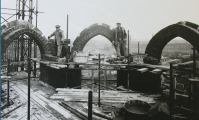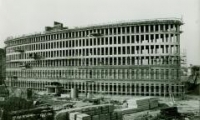This PhD studies the emergence and professional development of general contractors in Belgium from a long-term perspective (1870-1970). From the 1870s onwards, a combination of circumstances created a climate that enabled the emergence of these construction actors in Belgium. The changing nineteenth-century construction industry initiated a growing need for organisational efficiency, the implementation of tender procedures and the emergence of general contractors, who increasingly became responsible for both the organisation and execution of construction projects. Within the field of architectural and construction history research, there was an initial tendency to emphasise the role and oeuvre of architects in this nineteenth-century construction sector. In later years, other construction actors such as engineers gradually became a focus of study. Research on Belgian general contractors has only been initialised in recent years. Therefore, to date little was known about the establishment of this professional group, their precise tasks and responsibilities, their interaction with other actors such as architects and engineers, and their developments in the twentieth-century Belgian construction sector. In order to address this lacuna, this study analyses the establishment and professionalisation process of Belgian general contractors over a long-term period, from the establishment of the first professional associations of general contractors in the 1870s until they achieve an up-to-date legal framework with the Vestigingswet (1964) which acknowledged and confirmed their position within the Belgian construction industry.
In order to gain insight into the gradual development of this professional group, the methodological concept of professionalisation is used, which originally stems from sociological research on the Sociology of Professions. However, in this study a critical interpretation is given to the concept, taking into account formulated criticisms and the specificity of the Belgian general contractors’ context. Therefore, different professional levels are analysed to sketch the general contractors’ development as widely as possible: ranging from 1) micro level: specific general contracting firms, to 2) meso level: professional general contractors’ associations, to 3) macro level: interactions with other building actors such as architects and engineers in the broader construction sector. Furthermore, the legal context and demarcation of the general contractor's profession is dealt with in the three sections, because it was of crucial importance for Belgian general contractors on all three levels. This dissertation consists of two chronological parts, zooming in on the periods 1870-1930 and 1930-1970, since the research showed that in 1930 a number of transformations occurred that affected the evolution of the general contractors’ profession. Within each chronological frame, the central research question - focusing on the development of Belgian general contractors - is broken up in three sections that cover the micro, meso and macro level. In order to analyse these different levels of the Belgian general contractors’ profession, the research is based on a very broad and rich literature and archival analysis in which both well-known sources (such as the Moniteur Belge/Belgisch Staatsblad) are reviewed, but especially new archival material is investigated in-depth and systematically: business archives of general contracting companies, archives of professional general contractors’ associations and general contractors’ periodicals. This analysis allows to gain insight into the changing tasks of general contractors, into the role played by the national general contractors' association in their professionalisation process, and into the effect of the establishment of this professional group on other construction actors such as architects and engineers. It allows to sketch a more accurate picture of the tasks and responsibilities of the various actors in the historical Belgian construction sector.




